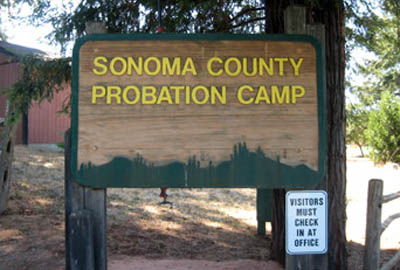When you hear the word “boundaries,” what comes to mind?
A crossing guard in full uniform, his squinty eyes leveling you with disdain?
Or an insurmountable barrier, like a barbed-wire fence with Rottweilers on the bottom and sharp, pointy spikes on top?
Or maybe you think of “boundaries” in the psychological sense: A granola-loving, tofu-smacking therapist who likes to explore “feeeeeelings” and “protecting personal space.”
With apologies to the Rottweiler fans, this post is about the granola version of the word.
There are several myths and misunderstandings about boundaries, and we’re going to explore them right now!
(As opposed to later. I’m setting a boundary. See how easy it is?!)
I first came across this list in a training for my job. I loved it so much, I saved it and still refer to it occasionally. It’s from the book “Better Boundaries: Owning and Treasuring Your Life” by Jan Black and Greg Enns.
6 Myths About Boundaries
Myth #1: Boundaries are selfish
I love this one. Have you ever noticed when someone accuses you of being selfish for setting a boundary, it’s because you’re not doing what they want you to do? Tricky, tricky!
Boundaries are selfish only in the best sense of the word.
When you take care of yourself by setting boundaries, you’re actually more available to help and serve others.
Myth #2: Boundaries are a waste of time
If by “waste of time,” you mean “positive, constructive actions designed to maintain balance and peace of mind,” then – by all means – boundaries are a waste of time.
For the record, time spent setting boundaries in your personal and professional life can literally save your life.
So they’re only a waste of time if you’re planning on having no time. Because you’re, like, dead.
Myth #3 Boundaries make relationships more difficult
It is true that boundaries can cause difficulties initially, especially if others are resistant to them. But relationships without healthy boundaries are beyond difficult. Try: codependent, addictive, destructive.
It may be difficult at first to set and maintain boundaries, but this pales in comparison to the mayhem of boundary-free interactions.
Think World War III, in the emotional sense.
Myth #4 Boundaries are a fad
Fads are things that come and go. They’re popular one day and gone the next.
That’s not what boundaries are. Boundaries have been around forever.
Picture this: Two Neanderthals are living in a cave. She likes to go to bed early. He likes to invite his buddies over to stay up late and trade hunting stories. Finally, after months and months of sleepless nights, she sets a boundary: It’s me or your buddies. He chooses his buddies and she hooks up with the cavewoman next door.
Boundaries. They’re as old as time.
Myth #5: Boundaries don’t work
Yes, they do. The only reason they don’t work is that they haven’t been implemented correctly.
Like this:
Person A – “I need to spend time alone tonight.”
Person B – “But I was looking forward to hanging out with you. Can’t you do it some other time?”
Person A – “But – ”
Person B – “Pleeeeeeeese?!”
Person A – “Okay. I’ll do it some other time.”
The “my bad” in this scenario belongs to Person A. She can blame Person B all she wants, but it’s up to her to maintain her boundary. Even if it’s hard.
If we set boundaries, they will be challenged. It’s part of the deal.
The challenge doesn’t mean they’re not working.
It means they are.
Myth #6: Kind, loving people don’t set boundaries
Here’s how it works: Some kind, loving people set boundaries. Some don’t.
The ones who don’t set boundaries end up burned out and unable to continue giving. They’re still kind and loving. But they need to apply that kind, loving energy to themselves in order to recharge.
Better to set boundaries all along and not have to burn out.
Let’s review this list one more time, but from the point of view of the Truth behind the Myths:
Myth #1: Boundaries are selfish
Truth #1: Boundaries are self-actualizing
Myth #2: Boundaries are a waste of time
Truth #2: Boundaries are a powerful use of time
Myth #3 Boundaries make relationships more difficult
Truth #3: Boundaries make relationships healthier
Myth #4 Boundaries are a fad
Truth #4: Boundaries are as old as time
Myth #5: Boundaries don’t work
Truth #5: Boundaries work when they’re implemented correctly
Myth #6: Kind, loving people don’t set boundaries
Truth #6: Boundaries help kind, loving people thrive
Now that we’ve busted the 6 myths about boundaries, I want to tell you a story.
This story is about my friend Alaric and it’s one of the best stories about boundaries I’ve ever heard.
When I was working for the County of Sonoma as a Social Worker, Alaric came to join our team. He was in charge of the Dads Make a Difference Program (DMAD). DMAD provided support and services for young fathers, including parenting classes.
One of Alaric’s jobs was to transport the young men to the classes.
Several of the fathers were residents of Probation Camp. Probation Camp, for those of you who don’t know, is a step down from Juvenile Hall. You’re given a few more privileges, but you’re still not free.
Alaric was given the task of overseeing the young fathers while they ventured out of Probation Camp to attend the parenting classes. He would pick them up in a van, drive them to class, and escort them home.
One evening, on the way to class, Alaric and his van full of young fathers were sitting at a red light. All of the sudden, one of the young men jumped out of the van and ran away.
The other guys sat there, speechless. They turned to Alaric.
“Aren’t you going to go get him?!” they said.
After all, this young man was in Alaric’s care. It was his job to look after him, to make sure he got back to Probation Camp. Wasn’t he going to grab him and get him back in the van?
“Nope,” said Alaric. “Not my job.”
There was no question, no hesitation in his mind.
When he told me this story, I imagined myself in his place. I would have been totally stressed, torn between staying with the guys in the van and running after the guy who got away.
But Alaric was totally clear. He knew what was his to do and what wasn’t.
We later found out that the young man who fled had been pretending to be a father. He signed up for the parenting classes so he could run away. In other words, his escape was bound to happen. It was only a matter of time.
If Alaric hadn’t set a boundary, he would have risked losing the other guys in the van. And he most certainly wouldn’t have caught the young man who was intent on getting away.
Setting a boundary didn’t make Alaric selfish. It wasn’t a fad or a waste of time. It didn’t make things more difficult. (The young man was eventually found and returned to custody.)
It was exactly the right thing to do.
That what boundaries are, when implemented correctly. Exactly the right thing to do.
I thank my friend Alaric for showing me this.
When did you set a boundary? What was the result?













Good Morning Z: Wow, first two words I am feeling after this one is:
blessed and grateful…….Pretty cool boundary. Its only been a little over two
years when my personal Services Co-oridinator, in the Sonoma County
F.A.C.T. program gave me some personal attention. She brought in some small balls of yarn. I am not a sissy but I still know how to play jacks, hula hoop and those things……..Well, my ego felt strange, kinda “ON-Guard”
That feeling left quickly since I had been building trust with her ( trust in a woman, no doubt) THe next moment was the next right move cause I got to pick my own ball of yarn, THe next right thing was, I could take my ball and go anywhere in the room with it and shape things this way or that way. This was fun and then it happened…………she told me I had set my very first boundary and I get to be in charge of who gets to come in or who I won’t allow
to enter. Today, I am working with skein of purple yarn creating every single
day the biggest ball I can . It’s kinda like wrapping all of those crossed boundaries and creating sumpin. There will be a day when I tie this ball to the bumper of my “little red wagon” and go everywhere I want with it so I can deliver the goods like I use too as a little boy……God Bless…now I can breathe:)
Hi Michael,
Thank you for the analogy in terms of setting boundaries. Sometimes it can really help to ground these ideas in actual, physical reality. Like yarn. 🙂
And good for you for making sumpin big and substantial!! Go you!!
Keep breathing,
XOZ
Boundaries! What an awesome topic. Since most people see me as very strong, outspoken, and independent, they don’t usually know how challenging boundaries have ben for me. They get easier over time, yet it can seem like the emtional equivalent to pulling teeth to practice them, especially because I didn’t keep them. Oh, I could set them, but keeping was a whole other story! I now understand that my loved ones might not ever realize that the process can be exhausting to me…. #1 Seeing the need for the boundary, #2 Speaking the boundary, #3 Keeping the boundary, #5 Reviewing “Do I need this?”, “Is it serving me?”. But through practice I’ve found that the big fear I’ve had in setting them is loss of love, initially it can feel paralyzing…then I get to feel safe and explore when and if I can remove them, while providing the love for myself during the process.
Dearest Z, you are such a wonderful example of someone who’s so good at boundaries, thank you, thank you! PS your youngest subscriber LOVED the Big Bang Rap. Yesterday he marveled at why you don’t have a ton of teen subscribers esp. @ CSLSR? G 🙂
Hi Georgia,
Thank you for this thoughtful and thorough description of the challenges involved in setting and keeping boundaries. Beautiful! I especially appreciate your awareness of the underlying fear of loss of love. So true.
I remember when I first learned about this topic, in my early twenties. I realized, pretty early on, that there were two choices – setting boundaries, or not – and that neither one felt good. In other words, even though setting boundaries served me in the long run, in the short run it was extremely uncomfortable. Especially to the people-pleaser part of me.
Thank you for letting me know that the rap was well received. 🙂 It was SO fun to do – I’m glad that others enjoyed it as well!
XOZ
good morning, Z! happy tuesday! yay boundaries!
approximately 4 years ago, i would have argued every aspect of this topic with you. you see, i had no boundaries. i was in a dark time in my life and i hadn’t learned to even like myself, let alone LOVE myself, enough to have healthy boundaries. and i didn’t like other people’s boundaries, either.
now, i set and keep my boundaries (as long as i don’t put qualifiers in place) and respect other people’s boundaries.
it has been my experience that the more i love myself, the stronger my boundaries are and the less likely i am to break them. love it.
great topic, z.
xos
ps
everyone i’ve talked to loved your rap. props. thanks for “bringing it”. 😉
Hi Squirrel!!
As I read your comments, I notice the strong link betweenlLove and boundaries. It’s interesting, as those words aren’t often linked – at least, in most people’s minds. But I’m seeing, in your evolution, the essential link between the two. Congratulations on growing in love for yourself! There’s nothing better.
And thanks for the feedback about the rap. Yay! 🙂
XOZ
Dear Z! What a perfect invitation for me, for today! To have your invitation and support for just the simple consideration of what is mine to do? Of course I can sense a lot about the discomfort of others but that doesn’t remove the natural need to sense what is right for me to do. Thank you for the heads up! It was the perfect day to notice more about this and to do something with it! Simple and wonderful how easy it is really to check with one’s inner self, or body in the larger sense, or inner wisdom, or presence, or center. The something that actually does know something about what would be more right for me, today.
Thank you more, Love, Laura
Hi Laura,
Thank you for your comments! I like that you point out the importance of that question: What is mine to do? It’s such a big question. And it can bring up answers that bring discomfort at first. But the answers can lead to huge benefits as well.
I also like that you point out that we already know the answers. They reside in our selves, our bodies, our intuition. Sometimes, this work can even be fun! :
Great to hear from you,
XOZ
“Life in Z – D.” Thank you Z. I am catching up on reading your wise, funny, so true, sooooooo very well written blog! Boundaries!!!!!!!! Why r they so hard for me. At least I KNOW I it is really hard for me to set boundaries. (MY cat and I r fighting for my lap right now where I have my keyboard. I don’t want to make Rascal uncomfortable !!!!!?????? What do u mean? I can’t set Boundaries???!!!???? Sometimes I don’t realize till later that I should have set a boundary, sent a clearer message. Really hard for me someimes. Still working on it despite the fact that I am evolving into an “older” {gasp} “mature”, “wise” woman [?!?!?!]
Hi Susan,
Yes, I notice that boundaries show up everywhere, even with our pets. Our cat, Lucy, is a great teacher for me, as far as boundaries. She seems to have no problem setting – and keeping – them. Once again, she is my spiritual teacher. And when I set boundaries with her, I notice that she might be pissy at first, but then she forgives me very quickly. Yet another lesson.
It’s never too late to keep learning, eh?
XOZ